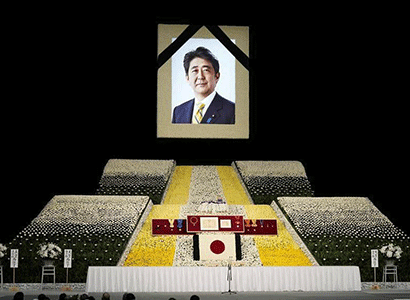 |
| A portrait of former Japanese prime minister Shinzo Abe is displayed inside the Nippon Budokan in Tokyo. |
Japan gives former PM Shinzo Abe a final send-off
TOKYO (Straits Times/ANN) -- Former Japanese prime minister Shinzo Abe, a giant in diplomacy yet controversial at home, was given a final send-off in a state funeral attended by about 4,300 guests, including 700 from abroad, on Tuesday.
The event was held at the Nippon Budokan arena that had hosted Olympic events, but is also a stone’s throw from the Yasukuni Shrine seen as a symbol of its wartime history.
Inside the Budokan in central Tokyo, a large portrait of Mr Abe draped with black ribbon hung over a bank of green, white and yellow flowers. Nearby, a wall of photos showed him strolling with Group of Seven leaders, holding hands with children and visiting disaster areas.
The service started at 2pm (1pm in Singapore), with Mr Abe’s ashes, in a box covered with a decorative fabric, carried into the Budokan hall by his widow, Akie, dressed in a black kimono.
Music was played by a military band and a 19-gun salute was sounded in honour of the slain ex-premier.
The mood was sombre in the arena. A video montage looking at some key moments of Mr Abe’s political life was shown during the service, followed by eulogies from leading ruling party figures, including Prime Minister Fumio Kishida and Mr Yoshihide Suga - Mr Kishida’s predecessor as prime minister and chief cabinet secretary during the second administration of Mr Abe.
Mr Kishida, who served as Mr Abe’s Foreign Minister, said in an emotional tribute: “Mr Abe, you were someone who needed to live a long life. I was convinced that you would have done your best for the next 10 - no, 20 - years as a compass to show the way for Japan and the world.”
Both men entered politics for the first time in 1993. Mr Kishida remembered the highlights of Mr Abe’s tenure as PM, citing his tireless diplomacy through which he built bridges across the world and developed the Free and Open Indo-Pacific framework as well as domestic policies such as Abenomics.
“On top of the foundation you laid, I pledge to build a sustainable, inclusive Japan, as well as a region and a world where all people can shine.”
Mr Suga, speaking in the capacity of a close friend, remembered Mr Abe as someone with whom he had shared his best memories with.
“Never has a day gone by when you were in Tokyo that we did not speak. Even now, when I’m alone, I can’t help but reminisce those days,” he said. “We spent seven years and eight months together at the Prime Minister’s Office, sharing all kinds of joys and sorrows. It was a period of pure bliss.”
He recounted how he spent three hours at a yakitori (chicken skewers) restaurant in Ginza, trying to persuade Mr Abe to become Prime Minister again for the second time in 2012. “That was probably my greatest achievement in my life,” said Mr Suga.
Former prime ministers such as Junichiro Koizumi, Taro Aso and opposition PM Yoshihiko Noda were also in attendance, as well as international leaders.
(Latest Update September 28, 2022)
|